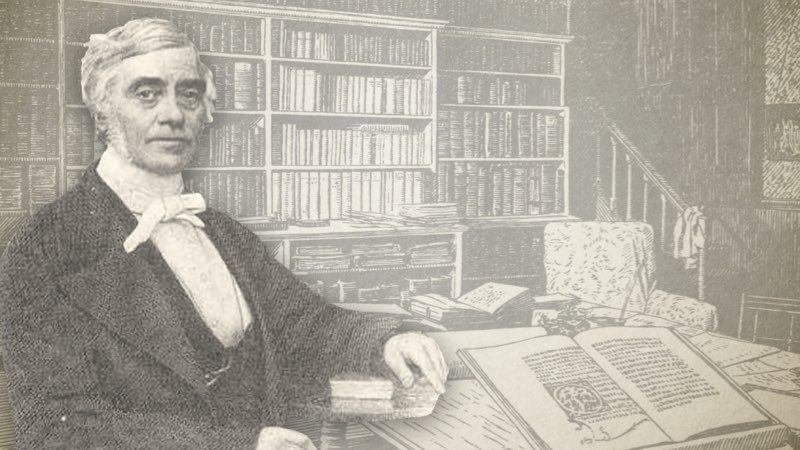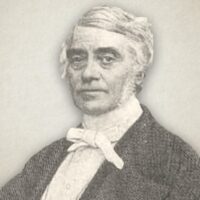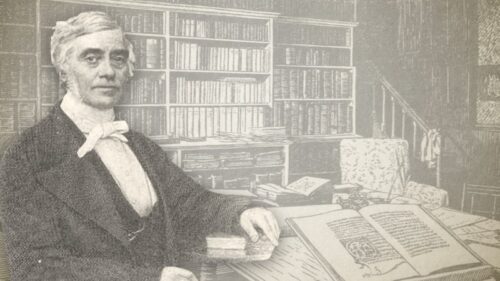
Those Living In Glass Houses Don’t Throw Stones
December 11, 1834.
My dear Friend Parry,—Having a favorable opportunity of transmitting you a letter by a private hand, I sit down to write you a few lines.
And, first, let me ask how the things of the Lord are going on in your soul? Are you, like most of us in these parts, saying “My leanness, my leanness! woe unto me!” Are you putting your mouth in the dust—if so be there may be hope? Are you crying with Paul of old, “O wretched man that I am! who shall deliver me from the body of this death?” Are you indulged with views of the atoning blood and justifying righteousness of Immanuel? Do you see yourself complete in Him, and is He to you the chief of ten thousand and altogether lovely? Or are you buried in your farm and worldly business, and find your soul as hard as a rock and as barren as the sand? Is your continual experience, “The good that I would I do not, and the evil which I would not that I do”? And do you go about your farm restless, dissatisfied, weary of self, and yet unable to deliver your soul from darkness, guilt, and wretchedness?
It is commonly said that a fool can ask questions which a wise man cannot answer, and I find it a great deal easier to ask people about their souls’ experience than to answer them myself. As to my own state, I have but little life, feeling, or power in my soul, and sometimes seem to have none at all—and to care no more for the things of God than a horse. The Bible seems at times to have neither food nor savor in it, and all its mysteries appear shut up from my view. The love of idols fills my heart, and I go a whoring after them all the day. No trifle is too foolish to engage my attention, and take off my thoughts; and my heart seems to be a sink of infidelity, lust, pride, filth, and obscenity. I am, indeed, kept from ‘outward evil’, but so very wicked and vile is my heart that I can throw a stone at nobody.
Rumor brings strange things to our ears respecting Mr.—. I fear he has departed from those things to which he once testified as the very life and power of inward religion and vital godliness. The last account represents him as renouncing baptism. These things must sadly trouble the church at —, and shake the weak and unestablished, more especially, I believe, his doubt of the reality and power of his own religion. But we are to meet with everything to trouble and perplex us, and what is more trying than when “a standard-bearer faints”? The fall of the officers is much more trying than the fall of the soldiers. “Smite the shepherd, and the sheep shall be scattered,” was true of the great Shepherd, and is to a certain extent of the under- shepherds.
The young gentleman who will convey this either to Allington or, at least, to Devises is a son of Mr. L., of that place, and has, I trust, in him something good toward the God of Israel. He comes over sometimes to my lectures on a week-night, and seems really desirous after an experimental work upon his soul.
How is your health? Do you sometimes murmur that you are not so strong and healthy as those around you; and does pain never depress your spirits, and almost make you say, “I do well to be angry”? Oh, our natural hearts are strange compounds of rebellion, peevishness, and perverseness, and full of unkindness and ingratitude. It is well if we are sometimes melted down with a sense of our baseness and unkindness towards the great God who has so blessed us. My health is always very weak in winter, and I stay pretty much at home; but I find the old corrupt, earth-loving nature as much at work as in the streets of London.
Believe me to be, with Christian regards to Mrs. Parry, Yours affectionately in Christ Jesus,
J. C. P.
Joseph Philpot (1802-1869) was a Strict and Particular Baptist preacher. In 1838 he was appointed the Pastor of the Churches at Oakham and Stamford, during which time he became acquainted with the Gospel Standard. In 1849, he was appointed the Editor for the Gospel Standard Magazine, a position he held for twenty-nine years (nine years as joint Editor and twenty years as sole Editor). John Hazelton wrote of him—
“A man of great grace, profound learning, and with a literary style equal to any of his contemporaries. For twenty years he was editor of the "Gospel Standard," in which his New Year's Addresses, Meditations, Reviews, and Answers to Correspondents were outstanding features. His ten volumes of sermons, entitled "The Gospel Pulpit," and his four volumes of "Early Sermons," testify to his powers as an expositor of the Word, to the beauty of his illustrations, and the heart-searching character of his ministry. He was born at Ripple, Kent, where his father was rector, and educated at Merchant Taylor's and St. Paul's schools, entering at Oxford University in 1821, taking a first-class, and ultimately becoming Fellow of his College. He accepted an engagement in Ireland as a private tutor, but prior to his departure he was unexpectedly detained at Oakham. There he bought a book, "Hart's Hymns," and was much struck by the beauty of many of them. In 1827, in Ireland, eternal things were first laid upon his mind, and "I was made to know myself as a poor lost sinner, and a spirit of grace and supplication poured out upon my soul." He returned to Oxford in the autumn, and "the change in my character, life, and conduct was so marked that everyone took notice of it." Early in 1828 he was appointed to the perpetual curacy of Chislehampton, with Stadhampton—or Stadham—not far from Oxford. He soon gained the love and esteem of his parishioners. His Church was thronged, and his labours were unceasing amongst young and old. In 1829 he became acquainted with William Tiptaft (1803-1864), vicar of Sutton Courtney, and a friendship commenced which death alone severed. Both ministers had been led to know the truths of predestination and election and the final perseverance of the saints, and preached them with unflinching boldness. Persecution soon arose; it always does in some quarter when there is a faithful ministry. In 1831 Tiptaft built a chapel at Abingdon, where he remained as a Baptist pastor until his death. In 1835 Mr. Philpot resigned his living and his fellowship; the temporal sacrifice entailed was such that he had to sell almost all his books. Soon after this momentous step had been taken he preached in a chapel at Newbury, which some of his friends had procured for the purpose. He writes: "When I therefore began to open up that God had a chosen and peculiar people the whole place seemed in commotion. One man called aloud, 'This doctrine won't do for me!' and started out, and was instantly followed by five or six others. I was not, however, daunted by this, but went on to state the truth with such measure of boldness and faithfulness as was given me. Some of my friends at the chapel thought that the people would have molested me, but no one offered to injure me by word or action, and I came safe out from among them." He also writes: “——is, I fear, something like the robin spoken of in 'Pilgrim's Progress, who can eat sometimes grains of wheat and sometimes worms and spiders. I am quite sick of modern religion; it is such a mixture, such a medley, such a compromise. I find much, indeed, of this religion in my own heart, for it suits the flesh well; but I would not have it so, and grieve it should be so." He preached much at Allington, near Devizes, and in the Metropolis, and many other places. His ministry was attended by crowds, and was blest to saint and sinner. In 1838 he became Pastor of the Churches at Oakham and Stamford, residing in the latter town till failing health caused his removal to Croydon. At the time of his settlement at Stamford he became associated with the "Gospel Standard," and in 1849 he was appointed editor. He was a most interesting writer on the things of God. His sermons are experimental rather than doctrinal, but when he treated of doctrine it was in a comprehensive and scriptural way, as his "Meditations" amply prove. His book on "The Eternal Sonship" practically closed the controversy which gave it birth. His "Reviews" are most instructive and brilliantly written. Would that the younger members of our Churches made a study of them! "The Advance of Popery" was another work which had a wide circulation, and events today prove the accuracy of the forecasts so solemnly made therein. His "Letters" have been a means of grace to many, and it is refreshing through them to know the spiritual history of some of the excellent of the earth in their day and generation, and to have glimpses of services at Eden Street, Gower Street, and Great Alie Street Chapels, and at Came and other places, especially in Wiltshire.”
Joseph Philpot's Letters
Joseph Philpot's Sermons




